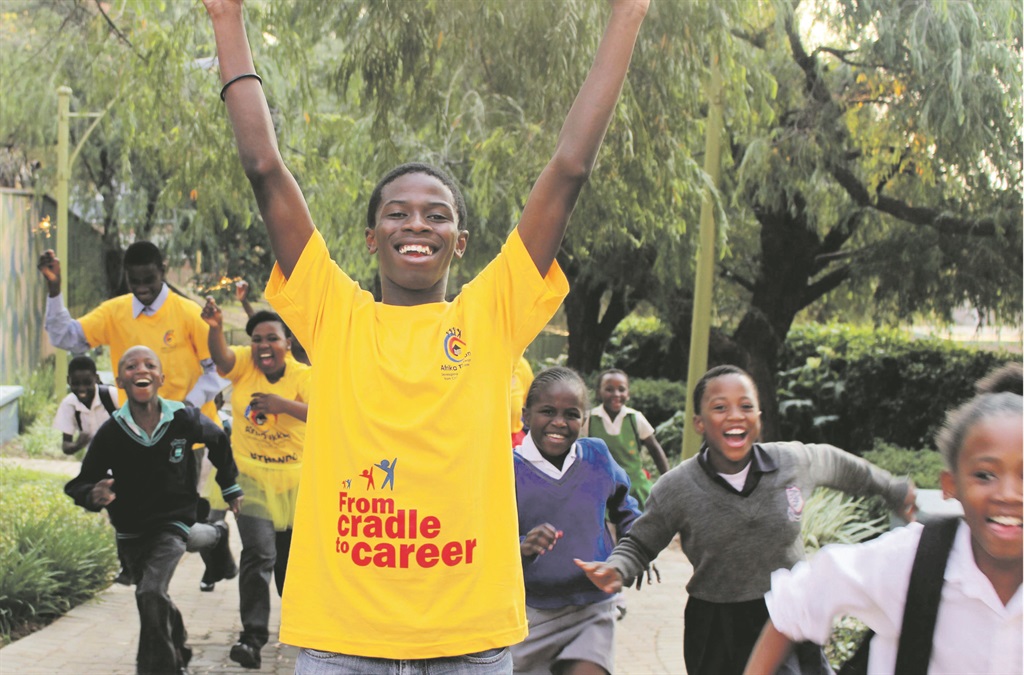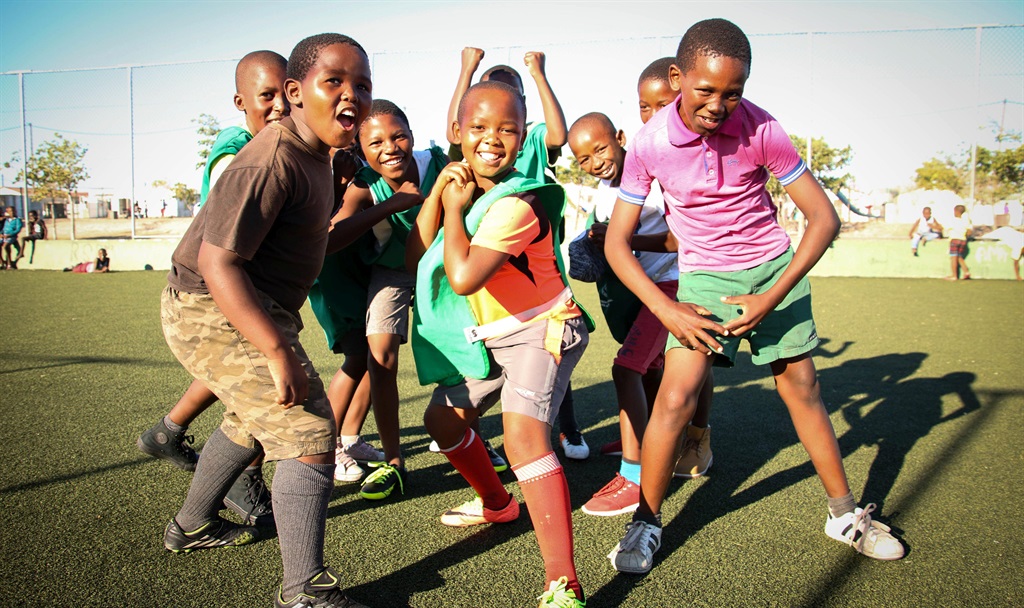
‘School sports in the township is dying a slow death if it isn’t dead already,” Thomas Taole says.
“But for South Africa to see the level and number of professional sports players it needs, we need to begin by ensuring the resources and facilities are present in the townships. And we are not talking only about facilities, but human resources as well.”
The handful of young people, identified by talent scouts and taken in by private schools, is a small percentage of what South Africa could be producing if the disadvantaged communities were appropriately resourced by government. A key solution to the lack of sports development is that physical education is not offered as a subject at schools.
“I work at private schools in Joburg simply because they are able to pay me. Township schoolteachers are overwhelmed, overworked and, most importantly, not trained to teach sport,” Taole says.
Physical education is 5% of life orientation and it is being taught by individuals who are not trained in physical education. They lack the technical know-how to develop athletes.
“I stand for the reinstitution of physical education into the curriculum and work with a team at North West University led by professor Dorita du Toit to campaign for the return of physical education to schools.”
Sometimes government builds the facilities without putting the appropriate human resources in place. Tennis courts and cricket grounds should not be built, for example, if you cannot provide training in those sports.
There also needs to be training on how to manage and maintain those facilities.
“You find people don’t know what to do with those facilities – they use them for weddings, church and funerals and the people who are meant to be benefiting do not,” Taole says.
Young people wanting to build sports careers as athletes or in sport administration, and who hail from townships, face a significant challenge because of these complications, as well as from the less obvious challenges, such as the expense required to be involved in local and provincial sports, he says.
For example, three years ago Afrika Tikkun had five girls who made the team to represent their district in netball. They were called to train at the University of Pretoria to represent the province.
“They had the talent, but neither we as an organisation nor their parents had the capacity or resources to get them there in the evenings – so that is where their careers ended,” he says.
When a young person represents a province, he or she stands a good chance of being scouted and could receive scholarships to play sports at university level – which in turn is an opportunity for young people to use their talent to get an education.
Sports administration courses require hidden costs, such as transport and accommodation, making this career option prohibitive for young people in townships and rural areas.
To solve this problem, Afrika Tikkun approached the Culture, Art, Tourism, Hospitality and Sport Sector Education and Training Authority – the Seta responsible for sports development – to offer sports administration skills and development training at Afrika Tikkun centres in townships.
We are in five communities and this would have enabled the Seta to train young people in sports administration on a large scale, without incurring the prohibitive costs in transport and accommodation. Internal changes at the company led to a lack of political will to do this.
Afrika Tikkun shifted its strategy and today is building partnerships with tertiary institutions to offer bursaries, including Boston College, the University of Johannesburg and the North-West University.
Another important consideration is that children and young people need holistic support so that they can play sport (especially if they are going to go places in sport).
Children and young people need to eat to exercise. To children who are hungry, sports is simply not an option.
The basic needs of the child are fundamentally important and take priority. For that reason, the government should partner organisations that support the 360° development model of the child’s nutritional, health and psychosocial needs.
This is particularly true for young people who want to pursue a career in athletics or sports.
Take Khanya Sibanda: he has been with Afrika Tikkun since he was five years old. He is out of school and is training (as best he can) to compete in the Tokyo Olympics track and field (800m and 1.5km) races. For him to succeed, he will need a professional team to support him – and it will be costly.
He will need access to a gym, a physiotherapist and a personal dietician to ensure he is getting the right nutrition for optimal performance. The institutions which help don’t favour underdogs, such as Sibanda, and instead will invest resources into athletes training at elite institutions.
Had Sibanda been exposed to physical education at school he would be 50% there already, because of his natural talent. But he did not get that, Taole says.
Any development programme for sport needs to start at age five and the aspiring athlete needs to put at least 10 000 hours into becoming a top performer.
“As a country we are being reactionary in our response to the challenge of transformation in sports,” says Taole.
“We are not solving at the grassroots level. That is why Afrika Tikkun’s model of 360° development from the age of two upwards is the best solution – expensive though it may be.”
To have a real effect on sports development you need a coordinated effort from all stakeholders which, at present, we don’t get right.
“That is why you don’t see many people able to build the kind of career I have been able to build in the past 30 years,” Taole says.
But through his efforts all this is starting to change.
“For the past 10 years my career has been focused on developing young people for the career of sports coaching and movement. I have trained and placed 20 young people into good entry-level coaching jobs at private schools and movement companies.”
One example of someone who has benefited from Taole’s support at Afrika Tikkun is Thabiso Peloeng. He started on a learnership at Afrika Tikkun.
“We saw his passion and talent in coaching and sent him for further training. We sent him to London to compete in a triathlon. He eventually became qualified to coach under-7s and, today, works for a company earning more than four times what he was earning with us.”
Through the partnerships he is building today, Taole is poised to direct many more young people into careers in sports and sports administration.
For the organisation, this capacity begins with recruiting passionate and qualified individuals to train Afrika Tikkun’s young people and equip them with a considered physical education curriculum.
Afrika Tikkun has recruited the assistance of experts, such as Du Toit, to contribute to sports education curriculums and training materials for its young people. This will go some way towards helping the organisation to ensure young people with talent are identified early and put on the right path for sport careers, both here and abroad, he says.
Afrika Tikkun has also experienced some success with the city of Johannesburg by establishing district-level netball leagues. With its support, and that of the Johannesburg Netball Association, it established netball leagues in Region F (inner-city Johannesburg), Region E (Alexandra) and Region A (Diepsloot).
“We put these leagues in place to enable regular and weekly competition for our netball teams. For our young people to get into university on netball scholarships, it is important that when scouts see them they are competent players and good athletes – who have been competing at the right level,” Taole says.
Through this partnership, resources are shared in such a way that it allows the community to benefit directly and overcome its resource challenge with regard to netball.
Another example of strategic partnerships is with Palesa Holdings, which saw the success the netball league had in Region F and contacted Afrika Tikkun to help. It offered financial management training for the sports team so that it could manage budgets.
“We realise that what we want to achieve is ambitious, but our team has been built to a point where we can achieve this for our young people,” says Taole, who is passionate about what he does.
“I am doing today what I was doing at the age of 13 – and that was 38 years ago. People would dismiss me and say, ‘He is just a child’. It is all thanks to the help of many people along the way who played a part in developing me and saw my passion. Anyone who wants a career in sports needs this kind of support and this is what we want to provide on a much larger scale to our young people through Afrika Tikkun and with the help of partners.
“We have had many failures and disappointments along the way. There have been times when we have not been able to find the resources we require to do the work, or when partners or stakeholders do not share the vision or the will; but we are making progress,” says Taole.
What is certain is that the task requires an appreciation of the big picture – and that it starts at grassroots.
“But more than that we need to appreciate the specifics. It’s all in the details – coordination and cooperation are required across private, public and civic sectors, as well as between basic education and tertiary education – so that career paths can be designed for each individual. The process must be facilitated as smoothly as possible.
“We also need to ensure young people are supported throughout their lives – most especially if they have the raw talent to really achieve. Expertise in this field is essential – from the educators to the curriculum and the government.
“Sports is a source of tremendous consumer interest and national pride.
“With the right investment it can be used to change the conversation we have about ourselves as a country and to excel. We have the capability to do it.” – Staff reporter
Afrika Tikkun was founded in 1994. Its goal was to make a difference in the country by developing and uplifting young people in underprivileged communities. With like-minded partners, it is passionate about developing youngsters through innovative and enterprising ways that will help the beneficiaries and help to grow the economy of South Africa.
They aim to end child poverty and youth unemployment through a holistic approach that begins in early childhood and ends with productive adults, accessing the economy. The model provides 360 degree care – nutrition, health and social – services to young people. This approach is called the Cradle-to-Career 360° model and it has earned Afrika Tikkun recognition for being one of the most effective education organisations in South Africa.
. For more information on Afrika Tikkun and its initiatives, call 011 325 5914, email info@afrikatikkun.org or visit www.afrikatikkun.org.




 Publications
Publications
 Partners
Partners










